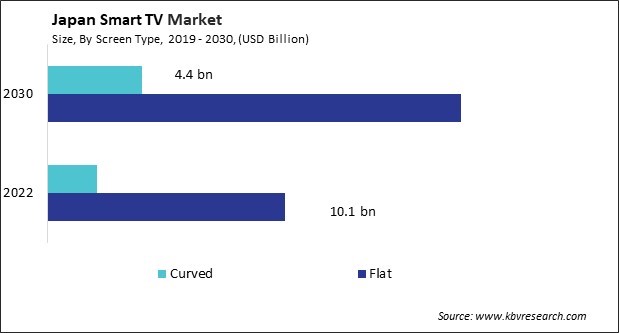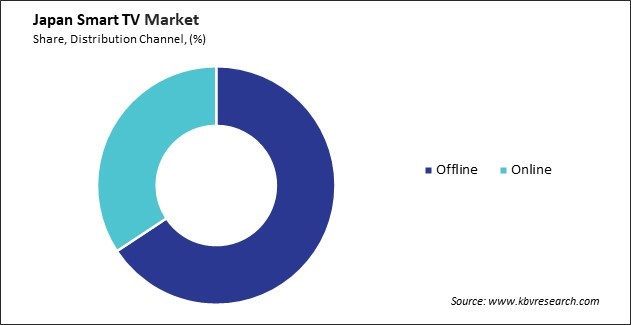The Japan Smart TV Market size is expected to reach $23.5 billion by 2030, rising at a market growth of 7.4% CAGR during the forecast period. In the year 2022, the market attained a volume of 22,327.9 thousand units, experiencing a growth of 8.0% (2019-2022).
As a technology-driven industry, Japan is witnessing continuous advancements in smart TV technology. Manufacturers present in this nation focus on introducing cutting-edge features, including high-resolution displays, advanced audio systems, and integration with smart home ecosystems. The adoption of high-speed internet and the availability of streaming services contribute to the popularity of smart TVs in Japan. Consumers embrace the convenience of accessing online content, on-demand streaming, and interactive applications directly through their smart TV platforms.

The smart TV market in Japan has increasingly become a central component of smart home setups. Integration with other smart devices, such as voice-activated assistants, smart lighting, and home security systems, provides users with a comprehensive and interconnected home entertainment experience. Smart TV content in Japan is often tailored to local preferences and cultural nuances. Streaming platforms and applications feature local and international content, providing a well-rounded entertainment experience for Japanese consumers.
5G's capabilities open the door for more interactive features in the smart TV market. This might include augmented reality (AR) content, real-time interactive applications, and enhanced second-screen experiences, aligning with the Japanese industry's inclination toward innovative and interactive technologies.
Smart TVs often serve as central hubs in smart home ecosystems. With 5G connectivity, Japanese consumers expect improved integration with other 5G-enabled devices, fostering a seamless and interconnected smart home experience. Faster download speeds facilitated by 5G lead to quicker content downloads and software updates for smart TVs. Japanese users enjoy more efficient access to the latest content and features.
The deployment of 5G networks enables higher data transfer speeds, facilitating smoother and higher-quality streaming experiences on smart TVs. Japanese consumers, known for appreciating cutting-edge technology, get the benefit of ultra-fast streaming without interruptions. Low latency is a crucial advantage of 5G, which significantly improves smart TVs' responsiveness. In gaming applications, for example, users in Japan might experience reduced lag and a more immersive gaming experience.
In 2022, Toshiba Corporation continued to play a significant role in shaping the smart TV market in Japan, leveraging its technological expertise and commitment to innovation. Toshiba's dedication to innovation might have been evident in incorporating advanced technologies, such as 5G connectivity, into its smart TV offerings. By embracing the high-speed capabilities of 5G networks, Toshiba smart TVs have provided users in Japan with an unparalleled streaming experience, virtually eliminating buffering and enhancing overall connectivity. Thus, the growth of 5G connectivity augments the demand for smart TVs.
The smart TV market is characterized by its dynamic nature, with technological advancements and sector expansion playing crucial roles in shaping its growth trajectory. Manufacturers in this industry are engaged in a perpetual cycle of innovation to maintain a competitive edge. The relentless pursuit of cutting-edge technologies is instrumental in meeting consumer expectations and driving demand.
The continuous evolution of smart TV technologies is due to high-resolution displays, integration of artificial intelligence, enhanced audio systems, and interactive features, among the innovations that captivate consumers. The demand for immersive viewing experiences and smart functionalities fuels the need for ongoing technological improvements.
AI algorithms analyze viewing habits, preferences, and historical data to provide personalized content recommendations. Japanese consumers benefit from tailored suggestions that align with their tastes, creating a more engaging and relevant viewing experience. Some smart TVs leverage AI for facial recognition capabilities. This feature is used for personalized user profiles, allowing the TV to identify individual users and customize content recommendations, settings, and preferences accordingly.
Smart TVs in Japan often incorporate advanced voice recognition technology powered by AI. Users control various TV functions, such as changing channels, adjusting the volume, searching for content, or using voice commands. This hands-free approach enhances user convenience.
Japanese smart TVs are designed with popular gaming consoles such as PlayStation and Xbox. Seamless integration allows users to connect their gaming consoles directly to the TV, providing an immersive gaming setup. Smart TVs in Japan support enhanced graphics and high dynamic range (HDR) technologies. These features contribute to more vibrant and realistic visuals in supported games, creating a visually stunning gaming environment.
Sony is a major player in the global electronics industry based in Japan. Sony not only has a strong presence in the smart TV market but is also known for its advancements in display technologies, including 4K and 8K resolutions, incorporating features like Android TV, advanced image processing, and gaming capabilities into their smart TVs. Hence, the increase in technological advancement has resulted in a growing demand for smart TVs in Japan.

Both local Japanese electronics manufacturers and global brands compete in the smart TV market. Local brands like Sony and Panasonic, known for their innovation, compete with international giants like Samsung and LG. This competition fosters a diverse industry with various options for consumers.
Japanese consumers emphasize premium quality and design when choosing smart TVs. Manufacturers respond to this trend by incorporating sleek designs, high-quality materials, and advanced display technologies to meet the aesthetic and functional expectations of the industry.
Sharp, a Japanese multinational corporation, has a history of innovation in the display and electronics sector. Sharp has been recognized for its efforts in developing high-resolution displays and slim designs and incorporating smart features into its TVs.
Panasonic is another well-known Japanese electronics company that produces various consumer electronics, including smart TVs. Like other major players, Panasonic is likely to invest in high-resolution display technologies such as 4K and 8K to enhance picture quality and provide a more immersive viewing experience to Japanese consumers. Panasonic has incorporated AI algorithms to analyze viewing habits and deliver personalized content recommendations. This leads to a more tailored and engaging experience for Japanese consumers.
Funai Electric Co., Ltd. has gained popularity by positioning its smart TVs in Japan as affordable yet offering good value for money. Providing feature-rich smart TVs at competitive prices attracts a broad range of consumers, especially those looking for budget-friendly options. In a competitive industry where significant players offer premium and high-end products, Funai's focus on affordability provides a competitive advantage. This is particularly relevant for consumers who prioritize value for money in their purchasing decisions.
By Screen Type
By Distribution Channel
By Resolution
By Screen Size
Our team of dedicated experts can provide you with attractive expansion opportunities for your business.

